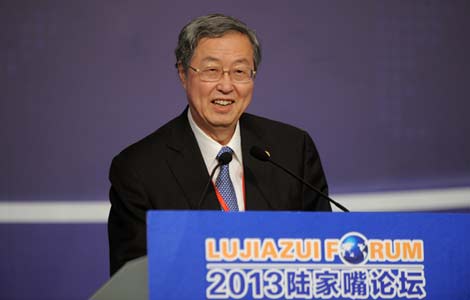West must work with the rest to secure Internet
Updated: 2013-06-29 07:37
By Wu Chu (China Daily)
|
||||||||
The exposure of the United States' Internet surveillance program by former National Security Agency contractor Edward Snowden has once again highlighted the issue of responsible state behavior in cyberspace, a subject Washington has been raising at bilateral and multilateral forums without accounting for its own illicit activities.
So what makes responsible state behavior? How should a responsible state behave when it comes to cyberspace?
First, a responsible state should abide by some basic but important canons in its international relations. Good faith is one of these canons. As the Permanent Court of Arbitration categorically said more than a century ago, the principle of good faith "ought to govern international relations". Good faith is not only a rule of international law, but also one of "the general principles of law recognized by civilized nations", and a common heritage of all civilizations.
But there is also another school of thought, which disregards good faith. For example, Machiavelli's followers believe that, "a ruler will perish if he is always good. He must be as cunning as a fox and as fierce as a lion. (he) should keep faith when it pays to do so, but not otherwise. A prince must on occasion be faithless." Followers of Schopenhauer are another example, for like the philosopher they do not practice what they preach.
At a time when China and the US are striving to build a new type of relationship, it is imperative that both should be guided by good faith, one of the basic requirements of international relations of which cyber security affairs is a part. They should refrain from taking any action that is not in line with good faith, such as "microphone diplomacy", and instead hold honest and sincere dialogue for their common good.
Second, a responsible state also should follow in good faith the principles of the UN Charter and other internationally recognized codes of conduct for cyber-related activities. The development of cyberspace has not (and cannot) change the international order. The governance of cyberspace should be premised on commonly recognized international law, especially the principles of the UN Charter, which include sovereign equality, non-interference in other countries' domestic affairs, and non-use of force in and peaceful settlement of international disputes.
As the final report of the Group of Governmental Experts says, international law, especially the UN Charter, is essential for maintaining peace and stability in cyberspace and promoting an open, secure, peaceful and accessible environment for information and communications technologies. A state's sovereignty and jurisdiction extends from the cyber infrastructure to the cyber-related activities within its territory. Also, a state has its own territory in cyberspace and its sovereignty is a tangible boundary of its intangible cyber territory, and a unified boundary applies to all its territories, including cyber territory. Besides, other states should respect a state's supremacy in its own cyber territory, where the principle of non-intervention is paramount.
Sovereign equality also means that global governance and management of cyberspace should not be monopolized by one country or a small group of countries. Furthermore, this function cannot be delegated to a non-governmental organization because it would lack legitimacy. So either the UN or a specialized inter-governmental body created for this purpose should be responsible for cyberspace governance.
Third, a responsible state should have a responsible concept or perception of cyber security. The interdependency of states and the common challenges they face in cyberspace make cyber security a global issue. So all states should hold sincere, constructive dialogue, and deepen their understanding and trust based on mutual respect to develop a peaceful, safe, open and cooperative cyberspace, and to achieve win-win results.
The UN's collective security system should apply to cyberspace too. In this respect, states should abandon detrimental and counteractive concepts that are not in harmony with the trend of our times.
One such concept is power politics and zero-sum thinking, some of whose examples are: one country's security is solely based on absolute and overwhelming military advantages over others, a Cold War enemy is forever an enemy or adversary and should always be contained, deterrence is always an important tool in foreign relations, and the emerging cyberspace is just another domain for confrontation and hostilities. The dangerous militarization of cyberspace is more or less based on such thinking.
Neo-colonialist thinking is another counteractive concept. Some Western countries' efforts to expand the Council of Europe-promoted Convention on Cybercrime worldwide remind us of how the West promoted the European Law of Nations across the rest of the world and turned it into international law, which indeed was part of the colonization process.
The West has always considered its policies and laws to be the best and forced the rest of the world to do the same. Do people keen on expanding the Convention on Cybercrime worldwide have the same colonial mindset that their ancestors centuries ago had?
The author is a Beijing-based observer of international affairs.
(China Daily 06/29/2013 page5)
Most Viewed
Editor's Picks

|

|

|

|

|

|
Today's Top News
US Senate approves immigration reform
Obama visits Mandela
Premier Li: Target for growth can be met
Prudent monetary policy to stay
Polluted river lifts cancer deaths
Looted relics return to China
Forty years of music with China
Industry to pay 15% more for natural gas
US Weekly

|

|















